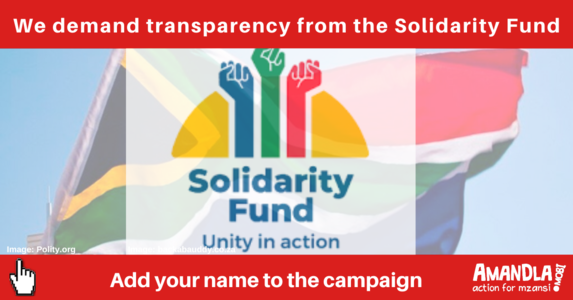Petition is successful with 437 signatures
To: Solidarity Fund Interim CEO, Nomkhita Nqweni
We demand transparency from the Solidarity Fund
This campaign has ended.

*Update* The Solidarity Fund set up a website and a consolidated report of how the money accumulated was spent.
When President Cyril Ramaphosa announced the Solidarity Fund on 23 March 2020, which was created to support South Africa’s health and welfare response to Covid-19 crisis, many South Africans believed that the impact of the lockdown, especially on poor communities, will be minimised through using these funds to support communities with food parcels and other humanitarian relief measures.
The fund has since accumulated R2.9bn in pledges of support, with more than R2.6bn already deposited. Donations have come in from 1,800 corporates and trusts and nearly 264,000 individual donors [1]. While the fund’s interim CEO, Nomkhita Nqweni has briefly outlined how some of the money was used, it is not evident how all the funds have been distributed.
Among many other relief measures, the fund supports struggling communities with food parcels. However, there are still many communities who, to this day, still haven’t received food parcels or relief services of any sort by the fund. [2]. Doctors and nurses in government hospitals and clinics have been forced to work without Personal Protective Equipment (PPE) [3].
In an update published on 22 June 2020, the Solidarity Fund claims to have provided support services and still is, and among these support services are [4]:
- More than 35 million pieces of PPE have been procured;
- The Fund has provided food relief to 280 000 families to date;
- The Fund approved R17m in funding for initiatives that support victims of gender-based violence as part of its efforts to assist those affected by the Covid-19 pandemic;
- The Fund approved funding of R7m for hygiene and safety content radio aimed at rural areas to help curb the spread of the virus.
The Solidarity Fund, however, fails to be transparent, by not being specific as to who has received these funds on behalf of the health sector, education sector, and for humanitarian relief.
The Solidarity Fund must provide a more detailed report on:
1. Who are the recipients of funds on behalf of the health sector, the education sector and for humanitarian relief services;
2. How the Solidarity Fund is keeping track of every cent that has been allocated;
3. Measures the Solidarity Fund is taking to ensure the funds aren’t misused;
4. And if the funds are being misused, what is the Solidarity Fund doing about it.
Why is this important?
It is unclear whom the funds have been allocated to, making it hard to know if the money is being misused for profiteering or personal reasons by the handler, and thus making it even harder to hold anyone accountable if the funds are being misused.
Now more than ever is the time to be transparent and accountable to people who are affected negatively by the lockdown. We need to know that the funds are being spent on people who need it the most and that the money is being distributed fairly and to responsible beneficiaries.
[1] https://www.businesslive.co.za/bd/economy/2020-06-22-solidarity-fund-approves-r14bn-for-covid-19-support/
[2] https://www.news24.com/news24/southafrica/news/feel-good-cape-town-domestic-worker-runs-food-aid-programme-for-neighbours-in-her-free-time-20200626
https://www.dailymaverick.co.za/article/2020-06-12-they-are-too-poor-to-eat/
https://www.groundup.org.za/article/feeding-poor-people-national-government-has-failed/
[3] https://www.groundup.org.za/article/residents-of-kliptown-where-the-freedom-charter-was-signed-still-dont-have-decent-toilets/
[4] https://solidarityfund.co.za/media/2020/06/22-06-2020_Update_Solidarity_Fund.pdf
Now more than ever is the time to be transparent and accountable to people who are affected negatively by the lockdown. We need to know that the funds are being spent on people who need it the most and that the money is being distributed fairly and to responsible beneficiaries.
[1] https://www.businesslive.co.za/bd/economy/2020-06-22-solidarity-fund-approves-r14bn-for-covid-19-support/
[2] https://www.news24.com/news24/southafrica/news/feel-good-cape-town-domestic-worker-runs-food-aid-programme-for-neighbours-in-her-free-time-20200626
https://www.dailymaverick.co.za/article/2020-06-12-they-are-too-poor-to-eat/
https://www.groundup.org.za/article/feeding-poor-people-national-government-has-failed/
[3] https://www.groundup.org.za/article/residents-of-kliptown-where-the-freedom-charter-was-signed-still-dont-have-decent-toilets/
[4] https://solidarityfund.co.za/media/2020/06/22-06-2020_Update_Solidarity_Fund.pdf
.png)
